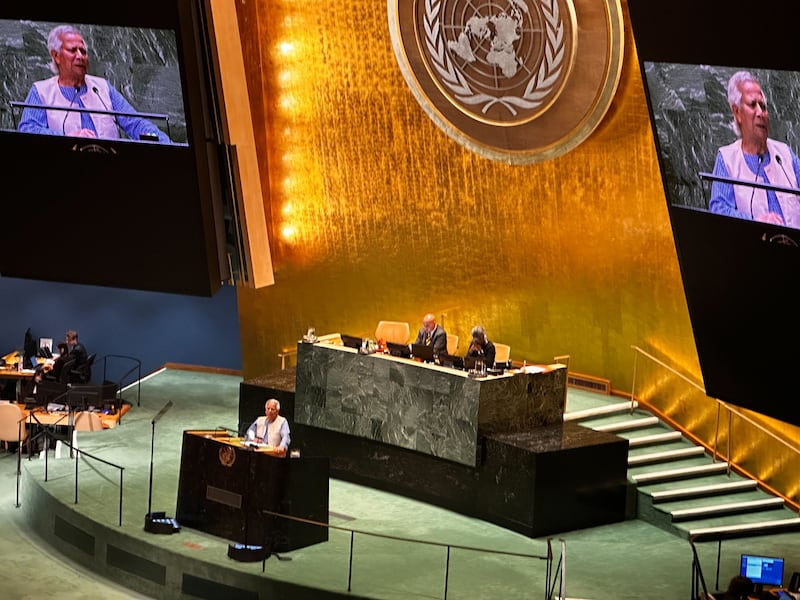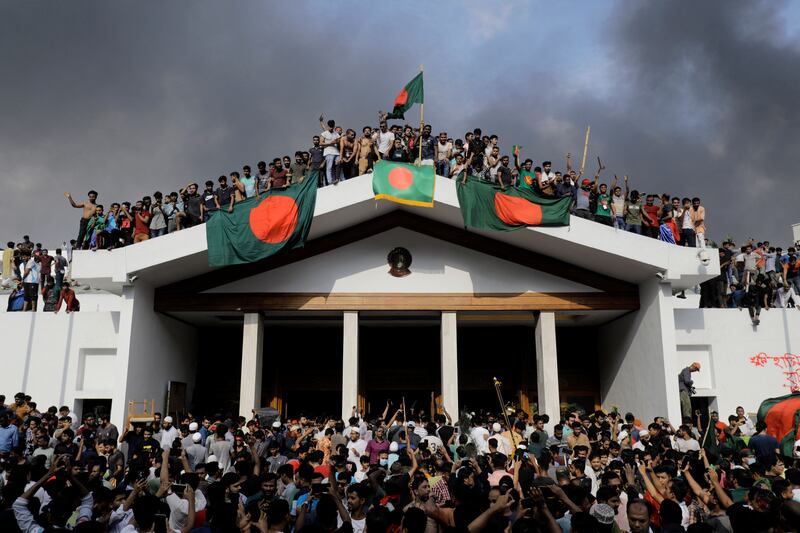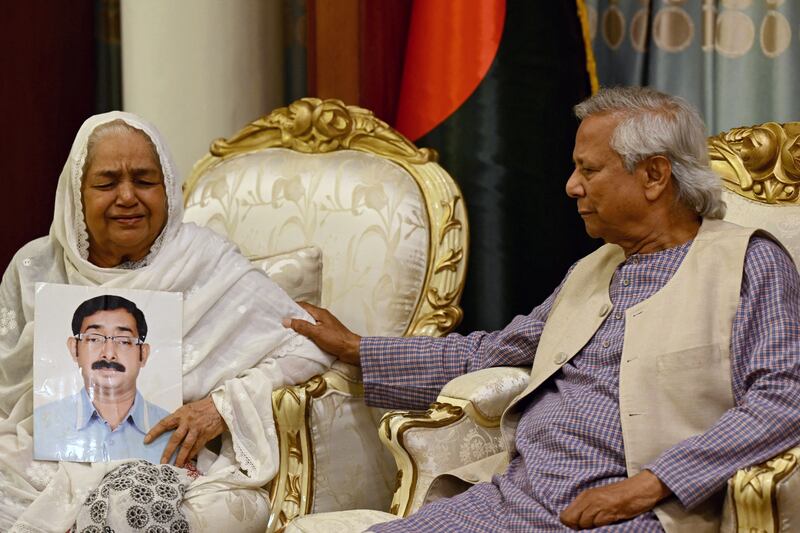In his first speech on the international stage as Bangladesh’s interim leader, Muhammad Yunus on Friday described how a short and swift “people’s movement” had thrust on him the responsibility of rebuilding state institutions to ensure free elections.
After loud cheers and applause greeted him at the hall of the United Nations General Assembly in New York, Yunus urged the world community to engage with a “new Bangladesh” that aspires for “freedom and democracy,” beyond mere words.
“I … call on the international community to continue and deepen engagements with Bangladesh in meeting our people’s quest for democracy, rule of law, equality, prosperity, so that we can emerge as a just and inclusive democratic society,” said Yunus, who spoke in Bangla.
He strode up to the podium in his trusty sneakers, wearing a blue-checked kurta-set with an off-white waistcoat.
“We believe, the ‘monsoon revolution’ that the world witnessed in Bangladesh in the span of [a] few weeks, may inspire many across communities and countries, to stand for freedom and justice,” he added, according to an English language transcript of this speech.
The 84-year-old Yunus, a 2006 Nobel Peace Prize winner, was named chief advisor of Bangladesh’s interim government in early August, after Sheikh Hasina had resigned as prime minister and fled the country.
Her downfall on Aug. 5 came after a weeks-long student protest turned deadly and became a mass movement against her 15-year rule, which many said was autocratic, suppressed free speech, crushed dissent and disappeared people.

In Friday’s speech, Yunus said that more than 800 people were killed during the student protests that began mid-July and lasted until Hasina’s resignation, mostly due to disproportionate police action and violence by supporters of Hasina’s Awami League party.
“Bangladesh was born because of her people’s profound belief in liberalism, pluralism, secularism. Decades later, our ‘Generation Z’ is making us re-visit and re-imagine the very values that our people … stood for in 1971,” Yunus said. He was alluding to the independence movement that Hasina’s late father, the country’s founding president, had led to break free of Pakistan rule 53 years ago.
The group of students that led the 2024 movement put forward Yunus' name for the post of interim leader, a suggestion accepted by a group that included the president, Army chief and opposition party representatives after a five-and-half hour meeting.
Although Hasina despised him, the Nobel laureate is a highly respected figure in Bangladesh and abroad. He is known for helping lift millions from poverty with his pioneering microloans concept, for which he was awarded the Nobel Peace Prize.
“I stand in this parliament of nations thanks to an epochal transformation that Bangladesh witnessed this July and August. The ‘power of the ordinary people,’ in particular our youth, presented to our nation an opportunity to overhaul many of our systems and institutions,” Yunus said as the audience again cheered.
“Our people, particularly youth, gained us independence from an autocratic and undemocratic regime with their exceptional resolve and capability. … This was indeed a movement that primarily brought together people who were long left in politics and development.”
Yunus said the movement’s participants aspired for a just, inclusive and functioning democracy.
“Our youth and people together entrusted me and my colleagues in the Council with enormous responsibilities to re-construct a decaying state apparatus,” he said.
Analysts say that Yunus and his advisors in the interim administration have to unravel 15 years of Hasina’s misrule, which included bending state institutions to her will, politicizing the civil administration, leaving the economy broken, and bearing responsibility for the hundreds who lost their lives in the protests.
In essence, the mandate given to this interim Bangladesh government, which took office Aug. 8, is stabilizing the country and preparing it for free and fair elections in the post-Hasina era.
Outside Yunus’ Manhattan hotel on Friday, some 50 U.S-based supporters of Hasina’s Awami League party gathered to protest against Yunus. They called him a “murderer” heading an “illegal” government.
“He was not elected. He has never been elected. He was selected by the students. He cannot represent 170 million people of Bangladesh,” Siddiqur Rahman, president of the Awami League USA, told BenarNews during their protest.
Rahman accused Yunus of being responsible for all the killings during the weeks-long violent civil unrest that led to the fall of Hasina’s government. Rahman was reacting to a statement made by the recently installed interim leader that the student movement was “meticulously planned.”
“These people meticulously designed the plan and because of that, thousands of people were killed. He is responsible for all the killings because he has accepted that it was these students who did this movement,” Rahman said.

At the General Assembly, Yunus reported to the United Nations that to achieve the mandate his interim administration was given, structural reform to a host of state institutions was necessary.
And work on those reforms has already begun in some priority areas, he said.
Yunus did not give a date or an estimate on when general elections would be held, although he has said that state institutions had been so politicized and compromised that their reform was a complex matter. And without that, it would not be possible to conduct unbiased elections.
“[W]e have launched independent commissions to reform the electoral system, constitution, judicial system, civil administration, [and] law and order sectors. A few more Commissions are on the cards to reform other sectors, including press and media,” Yunus said.
At Yunus’ request, the U.N. High Commissioner for Human Rights has sent a team to investigate the human rights violations during the people’s movement and to suggest the best action to take.
An inquiry commission is already investigating all the cases of enforced disappearances reported during the Hasina administrations totaling 15 years.

Extensive reforms are underway in the banking and financial sectors, from where analysts said large amounts were stolen by Hasina acolytes.
“We affirm not to let any foreign business interests to be affected,” Yunus assured.
And to ensure these reforms are sustained, Yunus said he aimed to set up safeguard mechanisms and engender an environment in which Bangladesh could conduct “free, fair and participatory elections.”
The people of Bangladesh, especially the youth who showed “the wisdom, courage and conviction,” deserved no less, Yunus said, as the audience again cheered loudly.
The students, he said, braved bullets bare-chested.
“School-going teenagers laid down their lives. Hundreds lost their eyes, forever. Mothers, day laborers and scores of people across cities lent their shoulders, for [the students they called] ‘their children,’” Yunus said.
“Defying sweat, rain and fear of death, they defeated all the evil designs and machinations of the few who manipulated the state machinery against truth and [the] just aspirations of people for years.”
